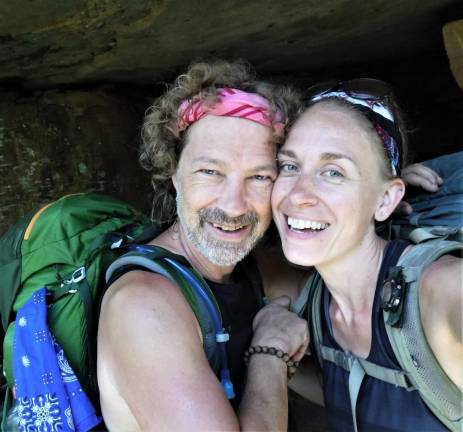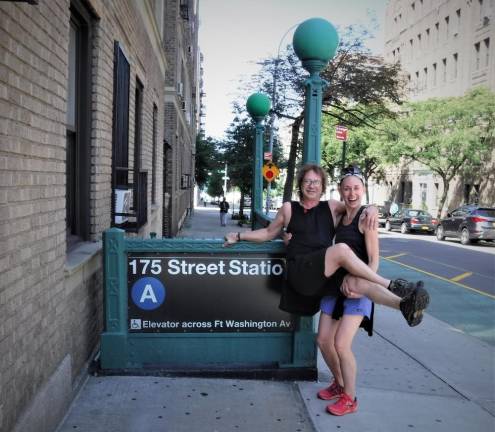Love in the time of ant-bite pustules
A seasoned thru-hiker takes the ultimate plunge: hiking with boyfriend


Birdsong trickled through the stillness — a sure sign that the rains had passed. Unzipping the door revealed clear blue skies and golden light spilling through the treetops. Beside me Scott rolled over with a huff, scratching his back, and then rolled over yet again, scratching his belly and around his shirt collar. Bright red bumps encircled his throat like a necklace.
“These bites itch like hell,” he said, now sitting up in our sleeping bag, still scratching.
“Oh, sweetie. Those look awful. Maybe there are some plantain leaves we can use outside in the grass.” Plantain leaves are a common weed that are highly mucilaginous. When moistened, most easily with your own saliva by chewing them up, they make an excellent poultice for quelling itchy bites. I crawled from the tent onto a dewy carpet. “Here’s some, love!” I announced excitedly, seeing the broad spoon-shaped leaves with their characteristic parallel veins. I plucked a couple and turned back for the tent when I saw that Scott was sitting with his shirt off. He looked at me with horror, his mouth agape.
“What the hell is this?!” Scott said, squeezing a fat red bump with his fingers.
“Oh my God, honey,” I said with a gasp, trying my best not to sound alarmed. Those little bug bites that we had seen two nights ago in the Time Hotel were now not only scarlet and angry but some the size of half dollars, each with a pus-filled pimple at its center. Closer inspection revealed more on his back and his arms, inside his armpits, up his neck, and even several on his nipples. I pulled up my shirt and saw that mine, too, had morphed into raised red bumps on my stomach and ribcage, but nowhere even close to the severity of his.
“Plantain is not going to do s***,” he declared. “What the hell is this?!” He repeated, itching more.
“Try not to itch them.”
“Well, they itch like hell!”
“Here, chew these up and put them on your bites,” I ordered, passing the leaves to him. “You chew ‘em!” he barked back.
I felt my face grow hot and I shot him a look that could burn all the plantain on the hillside.
“Look, I’m sorry. These are freaking me out! I haven’t even had a cup of coffee yet and you’re shoving leaves at me.”
“I know they are. I get it. I’m just trying to help,” I said, calming down. I knew he was miserable, and I, too, was freaked out. I had never seen anything like it.
“I know. I’m sorry,” he repeated.
“We have to figure out what this is,” I said, pulling out my smartphone to do some Google doctoring.
“Look, can you just make the coffee?” he asked, with a pleading look.
“Can you just chew the leaves?” I shot back.
“I’ll chew the damn leaves.”
“Deal,” I said, passing him the leaves. “There’s more outside.”
So, while the water boiled, I got to work. Search after search revealed the same likely culprit.
“It’s because I smooshed them,” he said with remorse, now sipping his coffee.
He was right. Well, I don’t know about the karma of smooshing them, but on the first night we camped on the Palisades cliffs, we had encountered red ants while cooking outside on the rocks. Likely, we carried them inside the tent on our sleeping pads and, as we laid blissfully sleeping, they dined on us like a buffet. Apparently, Scott had been tastier.
As we read more online, we learned that some people have severe allergic reactions to red ant bites, so much that they can become dizzy and delirious. I thought back on how frustrated I’d been with Scott for acting like a drunken fool in our last miles into Nyack. It all made sense. It was also not uncommon for the actual bites to appear 24 to 48 hours after contact.
Now we knew the cause, but as I continued to read about how easily they could become infected, my body tensed. I hated to say it, but we would need to take a couple days off the trail and give him some time to heal up. With the heat of his backpack and clothes rubbing against his skin, he would only aggravate the bites, and God forbid we didn’t keep them clean enough. Out here on the trail I’ve seen wounds as common as a blister land people in the hospital. I suggested we call home and get picked up or at least hike into town and try to get to a doctor.
“Nope, not doing it,” Scott said firmly.
“But hon, these could get worse,” I said, inspecting one near his belly button.
“No,” he said, shoving the leaves in his mouth and chewing. “If we go to a doctor, he’s going to tell me not to hike and we’re not stopping now, not even for a break. We’ll just keep them clean. I’ll be fine.”
“Hon, I won’t be upset. Taking a couple days off the trail is not the end of the world.”
“No. I’ll be fine. There’s plenty more plantain out here.” He spat the chewed leaves into the palm of his hand and placed the wad atop one of the worst-looking bites.
“Baby.” I gave him a kiss on the forehead, one of the few parts of his body that didn’t have a bite. I worried if hiking on was really the right decision or just plain foolishness. But, at the same time, my heart swelled. My pustule-covered baby was determined to hike this trail and whether it was for his sake or mine, it mattered not.
This is an excerpt from Love and the Long Path, due out this spring, the latest book by Wild Food columnist Heather Houskeeper. Find it at TheBotanicalHiker.com.